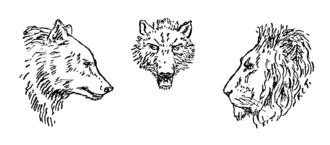The Original Fables of La Fontaine/The Companions of Ulysses

XXXVIII
THE COMPANIONS OF ULYSSES
(Book XII.—No. 1)
••••••
That great hero-wanderer Ulysses had been with his companions driven hither and thither at the will of the winds for ten years, never knowing what their ultimate fate was to be. At length they disembarked upon a shore where Circe, the daughter of Apollo, held her court. Receiving them she brewed a delicious but baneful liquor, which she made them drink. The result of this was that first they lost their reason, and a few moments after, their bodies took the forms and features of various animals; some unwieldy, some small. Ulysses alone, having the wisdom to withstand the temptation of the treacherous cup, escaped the metamorphosis. He, besides possessing wisdom, bore the look of a hero and had the gift of honeyed speech, so that it came about that the goddess herself imbibed a poison little different from her own; that is to say, she became enamoured of the hero and declared her love to him. Now was the time for Ulysses to profit by this turn of events, and he was too cunning to miss the opportunity, so he begged and obtained the boon that his friends should be restored to their natural shapes.
"But will they be willing to accept their own forms again?" asked the nymph, "Go to them and make them the offer."
Ulysses, glad and eager, ran to his Greeks and cried, The poisoned cup has its remedy, and I come to offer it to you. Dear friends of mine, will you not be glad to have your manly forms again? Speak, for your speech is already restored."
The lion was the first to reply. Making an effort to roar he said, "I, for one, am not such a fool. What! renounce all the great advantages that have just been given me? I have teeth, I have claws, I can pull to pieces anything that attacks me. I am, in fact, a king. Do you think it would suit me to become a citizen of Ithaca once more? Who knows but that you might make of me a common soldier again. Thank you; but I will remain as I am."
Ulysses, in sad surprise, turned to the bear. "Ah, brother! what form is this you have taken, you who used to be so handsome?"
"Well, really! I like that!" said the bear in his way. What form is this? you ask. Why it is the form that a bear should have. Pray who instructed you that one form is more handsome than another? Is it your business to judge between us? I prefer to appeal to the sight of the gentler sex in our ursine race. Do I displease you? Then pass on. Go your ways and leave me to mine. I am free and content as I am, and I tell you frankly and flatly that I will not change my state."
The princely Greek then turned to a wolf with the same proposals, and risking a similar rebuff said:
"Comrade, it overwhelms me that a sweet young shepherdess should be driven to complain to the echoing crags of the gluttonous appetite that impelled you to devour her sheep. Time was when you would have protected her sheepfold. In those days you led an honest life. Leave your lairs and become, instead of a wolf, an honest man again."
"What is that?" answered the wolf. "I don't see your point. You come here treating me as though I were a carnivorous beast. But what are you, who are talking in this strain? Would not you and yours have eaten these sheep, which all the village is deploring, if I had not? Now say, on your oath, do you really think I should have loved slaughter any less if I had remained a man? For a mere word, you men are at times ready to strangle each other. Are you not, therefore, as wolves one to another? All things considered, I maintain as a matter of fact that, rascal for rascal, it is better to be a wolf than a man. I decline to make any change in my condition."
In this way did Ulysses go from one to another making the same representations and receiving from all, large and small alike, the same refusals. Liberty, unbridled lust of appetite, the ambushes of the woods, all these things were their supreme delight. They all renounced the glory attaching to great deeds.
They thought that in following their passions they were enjoying freedom, not seeing that they were but slaves to themselves.
••••••
